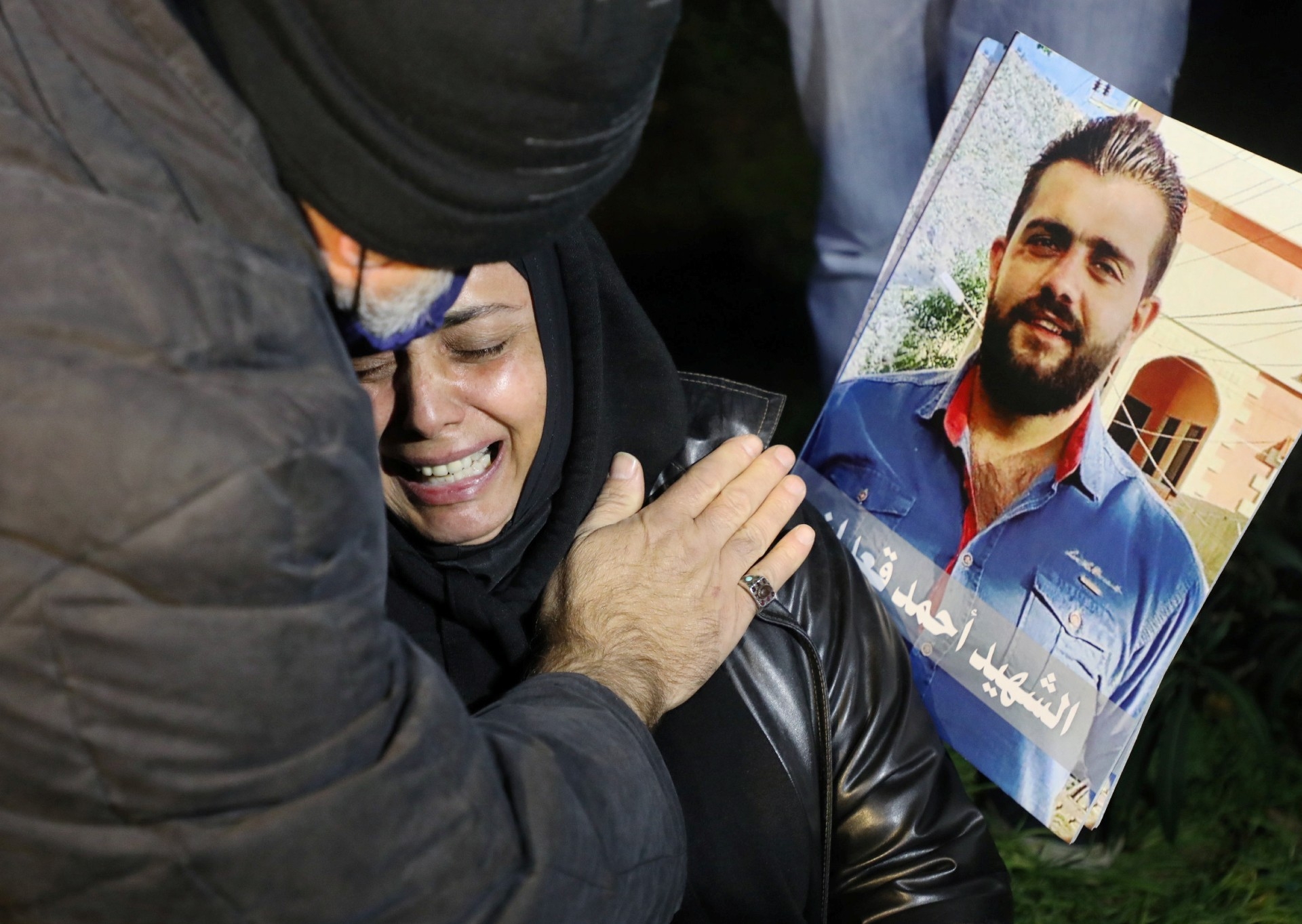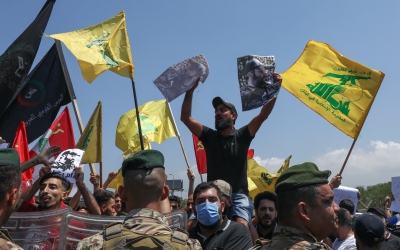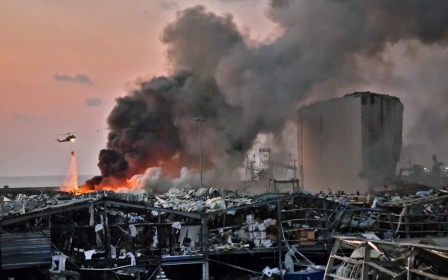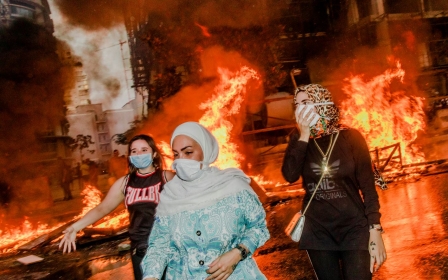Beirut explosion: Removal of judge sparks renewed fears that blast probe will go nowhere

Mahdi Zahrledine lost his brother Imad in the Beirut port explosion last August. Seeking relief and comfort, he has for months poured his energy into a committee of victims’ families, hoping to work towards justice and accountability.
However, after hearing on Thursday that Judge Fadi Sawan had been removed from leading the investigation into the blast that killed some 200, Zahrledine’s constructive outlook was replaced with rage.
“We reject the political interference in the blast investigation and toward Judge Sawan. As the brother of a martyr, I completely reject this,” Zahrledine told MEE over the phone as he headed to the Beirut Justice Palace from his Dahieh home, to protest alongside other victims’ relatives.
'We reject the political interference in the blast investigation and toward Judge Sawan. As the brother of a martyr, I completely reject this'
- Mahdi Zahrledine, victim's brother
“We, the families of the martyrs, are on our way now to protest against the corrupt political class and the MPs and ministers that led to Judge Sawan to being removed from the case.”
Sawan’s dismissal is the latest, and perhaps most significant, obstacle faced by the official investigation into one of the largest non-nuclear explosions in the world, which left large parts of Lebanon’s capital devastated.
New MEE newsletter: Jerusalem Dispatch
Sign up to get the latest insights and analysis on Israel-Palestine, alongside Turkey Unpacked and other MEE newsletters
The Court of Cassation’s decision to remove the judge came on Monday, the same day it also approved a request to release Beirut Port Authority head Hasan Koreytem and the port’s head of security Mohammad Ziad al-Awf. They’re among two dozen suspects that have been detained since the 4 August blast, including the head of customs, Badri Daher.
It’s now up to Sawan’s successor, reportedly likely to be a female judge close to President Michel Aoun, to give the green light for their release. A legal source close to the case told MEE that other detainees also had their requests for release approved.
Touching nerves
Sawan’s tactics began to touch nerves in Lebanon on 10 December, after he charged and summoned three ex-ministers and caretaker Prime Minister Hasan Diab.
Though the victims’ families and legal activists celebrated the move, senior political leaders across the board accused Sawan of violating Lebanese law and not working impartially. A judicial source close to Sawan told MEE that it was a scathing “political campaign”.
In response, two of the summoned ex-ministers took legal action. Ex-Finance Minister Ali Hasan Khalil and former Public Works and Transportation Minister Ghazi Zeitar, both of the Amal Movement, submitted a request to the judiciary to remove Sawan from the investigation.
One of the reasons Sawan was not a suitable investigator, they said, was that his home in Beirut’s Achrafieh district was partially damaged by the blast. Therefore, they claimed, there was legitimate concern over whether he could conduct his work impartially. At least 77,000 Beirut homes were damaged in the blast, according to the United Nations.
As a result, the probe was halted after the complaint, and did not resume until mere days before Sawan’s ousting.
Victims’ families and human rights organisations criticised the stalled investigation process and its lack of transparency. Families still had no answers, the senior officials charged last December appeared off the hook, and the mid and low-level detainees were unaware of what they were charged with.
During that period, Hezbollah’s opponents increasingly began to accuse it of responsibility for the blast, and media reports began tying three Syrian businessmen to the ammonium nitrate that was left rotting at Beirut’s port and caused the explosion.
In January, Hezbollah leader Hassan Nasrallah took aim at Sawan in a speech.
“It seems that Judge Sawan is only focusing on the administrative responsibilities,” Nasrallah said, calling on the “course of the investigation to be rectified”.
‘Respect the red lines’
Meanwhile, outside the Beirut Justice Palace, Zahrledine and other families raised portraits of their lost loved ones, as they protested the decision.
Ibrahim Hoteit, one of those at the protest, told Al Jadeed television that while they had concerns about Sawan, they wanted to see the investigation go through and not go back to “zero”.
“This was a political decision par excellence,” he said. “We don’t have any trust in the Lebanese justice system … we were gambling on an exceptional few [judges] who were impartial.”
Hoteit said he feels any impartial judge that may succeed Sawan could meet a similar fate.
Nizar Saghieh, lawyer and founder of NGO Legal Agenda, celebrated Sawan’s move to charge political officials in December. But Monday’s decision was a bitter reality check.
“This is considered a message for all judges to respect the red lines: it is forbidden to take action against politicians,” Saghieh told MEE. “If any judge dares to do so against any politician, they will be removed too.”
International organisations and human rights advocacy groups like Human Rights Watch (HRW) have called for an independent international probe. The removal of Sawan has led to a renewal of these calls.
“This charade needs to end,” HRW’s Lebanon researcher Aya Majzoub said in a statement. “We need answers, and Lebanon has shown that it is incapable of providing them.”
Lebanon has a history of troubled international investigations, however.
A United Nations special tribunal into the 2005 killing of former prime minister Rafic Hariri spent 15 years and eye-watering sums to come to a largely unsatisfactory end, with suspects tried and convicted in absentia.
Saghieh hoped that the lessons of that probe would be a “turning point” for the country.
“We said we hope this time we will have a different destiny than the one after the Hariri assassination,” said a frustrated Saghieh. “[We thought] let’s try the national justice system, let’s make a deal amongst us all to give a real chance to the Lebanese justice and build our judicial sovereignty.”
But now, he sees a continuation of the norm in Lebanon, whose elite he says continues to devastate the country with impunity.
“This led us to an [economic] collapse, a blast and totally illegal practices in Lebanon with lots of corruption because nobody is accountable - and this is normal.”
This article is available in French on Middle East Eye French edition.
Middle East Eye delivers independent and unrivalled coverage and analysis of the Middle East, North Africa and beyond. To learn more about republishing this content and the associated fees, please fill out this form. More about MEE can be found here.






